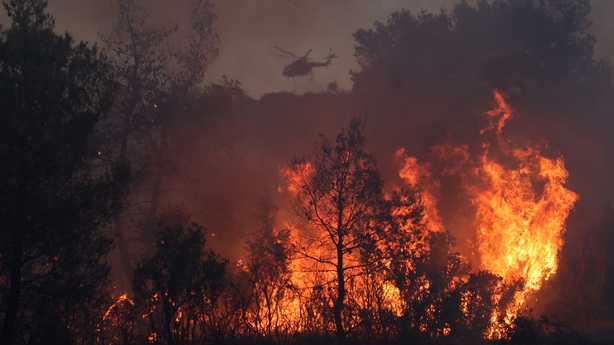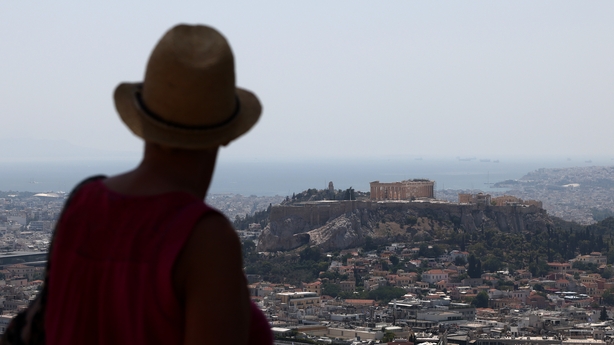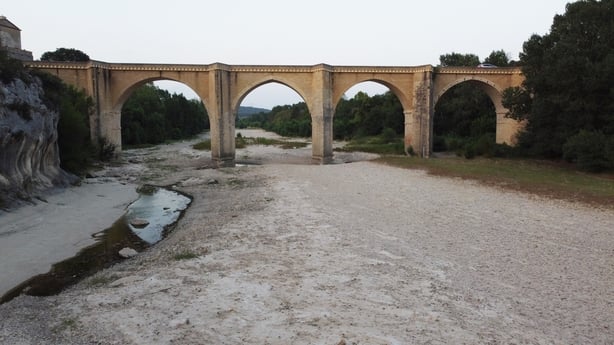The current heatwave gripping Greece is set to become the longest in the country's recorded history, a senior weather institute official has said, while a record-breaking heatwave stretching across the southern United States is expected to expand in the coming days.
"According to the data, we will probably go through 16-17 days of a heatwave, which has never happened before in our country," Kostas Lagouvardos, the director of research at the National Observatory, told ERT television.
Greece defines a heatwave as a period when temperature reaches or exceeds 39C.
The previous heatwave record in Greece was set in 1987, when the scorching temperature lasted 11 days.
The country is facing its hottest July weekend in 50 years, with temperatures forecast to soar above 40C.

Tens of millions of people in the northern hemisphere have been suffering through intense heat this summer as the world appears headed for its hottest July on record.
As temperature records tumble, experts have pointed the finger at climate change driven by the burning of fossil fuels, saying global warming is playing a key role in destructive weather.
Greece, which is battling dozens of forest fires, warned people not to venture out unnecessarily due to the baking heat.
The exceptional temperatures also mean key tourist sites such as the Acropolis will be closed during the hottest part of the day.
"This weekend risks being the hottest registered in July in the past 50 years," said Panagiotis Giannopoulos, meteorologist with ERT.
"Athens is going to have temperatures above 40C for six to seven days, through to the end of July."
Such a prolonged spell of scorching temperatures is exceptional for the Greek capital.
Tomorrow is likely to see the city labour under temperatures as high as 44C, with the central region of Thessalia enduring 45C.
A 46-year-old man was meanwhile reported to have succumbed to heatstroke on the central Greek island of Evia after being admitted to Chalkida hospital, which said cardio-respiratory failure following exposure to high temperatures appeared to be the cause.

The national meteorological institute EMY earlier reported temperatures of 41C in the Attica region, which encompasses the capital Athens, and forecasting up to 44C in Thessalia.
Yannis Kallianos, meteorologist with private broadcaster Mega, spoke of an "interminable and powerful heatwave".
"According to latest forecasts, the heatwave could last until next Thursday or Friday," Mr Kallianos warned, adding that strong northerly winds could also spark fires.
Authorities meanwhile reported firefighters were still battling 79 forest fires across the country, with their spokesman Vassilios Vathrakoyannis saying Greece would be on a state of alert through the weekend.
Greece is just one of a swathe of countries battling a prolonged spell of extreme heat around the globe in recent days.
Across the southern United States, about 80 million Americans will swelter in temperatures of 41C and above this weekend, the National Weather Service said.
The country's worst heat of up to 46C is forecast for Phoenix, Arizona, which has seen a record-breaking three weeks in a row of highs above 43C.
Read more:
What happens to your body during a heatwave?
Greek boats evacuate people threatened by Rhodes fire
There were hellish scenes in the city on Thursday when a fierce blaze erupted at a propane business near the international airport, sending tanks exploding into the air.
"Unfortunately, on a hot day like this, these propane tanks with that expansion of heat, they literally become missiles... They can travel upwards of 500 yards (metres)," Fire Captain Rob McDade told KPHO television station.
Tourists, meanwhile, have been flocking to Death Valley National Park, which straddles the border between California and Nevada, in order to post selfies with a temperature display outside the visitor centre.
Some heading there are doing so to try to see it break a world record of 56.7C, which was set in July 1913 but was likely the result of a faulty measurement, according to several meteorologists.

Regardless, July 2023 is on track to be the hottest absolute month - not only since records began, but also in "hundreds, if not thousands, of years," leading NASA climatologist Gavin Schmidt said.
The effects cannot be attributed solely to the El Nino weather pattern, which "has really only just emerged" and is not expected to strengthen until later on in the year.
El Nino is associated with the warming of ocean surface temperatures in the central and eastern tropical Pacific Ocean.
Mr Schmidt said the trend of extreme heat was expected to persist, "and the reason why we think that's going to continue, is because we continue to put greenhouse gasses into the atmosphere".
In May, the World Weather Attribution, whose scientists study the link between extreme weather events and global warming, said such extreme heat would have been "almost impossible without climate change".
According to the World Meteorological Organization, Europe is the world's fastest-warming continent which has been heating at twice the global average since the 1980s.
Since the mid-1800s, the world has warmed an average of nearly 1.2C.
But in Europe, the figure is almost double, with the continent now 2.3C hotter than in pre-industrial times, the organisation said in a report at the end of June.
'Climate change is obviously playing a role here'
Director of Met Éireann, Eoin Moran, who is also a vice-president of the World Meteorological Organization, has said that climate change is "obviously" influencing current weather conditions in many parts of the world, which he described as "alarming".
"Certainly climate change is obviously playing a role here," Mr Moran told RTÉ's Six One.
"Over the last number of weeks we've witnessed alarming, unprecedented toppling of records at a global level.
"From an air temperature perspective, we've recently seen the daily maximum temperature record topple - that happened on the 17th of July.
"Sea surface temperatures across the North Atlantic and across much of the oceans of the world are now breaking records."
Mr Moran also said that, in the Antarctic, "the level of sea ice melt is now significantly below any normal level and this is all before the heating effect of the El Nino really kicks in."
He added that the heatwave in southern Europe is the result of "a heat dome ... a stable, blocking atmospheric pattern that's almost stationary and acts like a lid on a pressure cooker".
But what is also happening in the Mediterranean, Mr Moran said, is that "we're looking at unprecedented, very unusually high sea surface temperatures - in and around 25 to 28 degrees Celcius - so unusually this is actually creating a situation where coastal communities are achieving very little relief".
Mr Moran said that Ireland is "seeing increased impacts in terms of temperature, in terms of average temperatures, and also rainfall and we're going to continue to see that build and grow due to the impacts of human-induced climate change".

